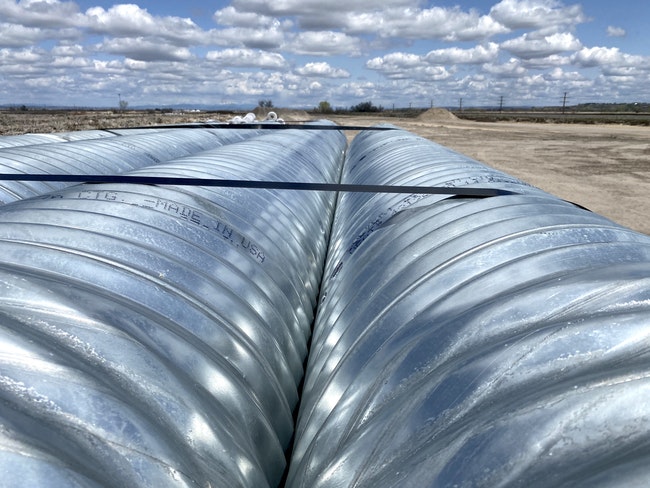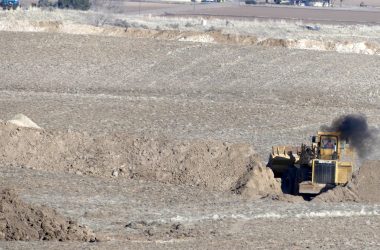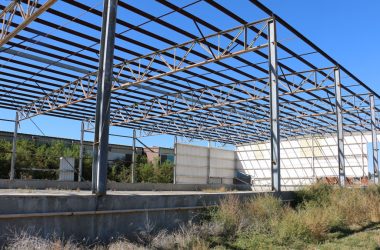NYSSA – Treasure Valley Reload Center officials over the past month have claimed – incorrectly – that no taxpayer money will be used to pay for the multimillion-dollar project.
They have insisted the project will be funded solely through the state’s sale of Oregon Lottery bonds, which are repaid by those who gamble in the state.
Their statements distancing the project from tax dollars come amid mounting criticism of the management of the Nyssa project. The rail center is behind schedule, short of money, and its opening once planned for June is now in doubt.
However, an investigation by the Enterprise established that the lottery money is expected to cover only about half the cost of state-funded projects like the Nyssa reload center.
The rest will come from a tax on car sales created in 2017, records establish.
And project leaders also have been seeking an emergency $3 million from the state in what would be a taxpayer bailout for the troubled project.
Both run counter to the repeated claims by center leaders that only lottery funds are involved in the state’s $26 million grant for the project.
 Jason Pearson, a director of Malheur County Development Corp., emphasized lottery funding at a May 17, 2022, meeting. (The Enterprise/FILE)
Jason Pearson, a director of Malheur County Development Corp., emphasized lottery funding at a May 17, 2022, meeting. (The Enterprise/FILE)
Jason Pearson, an onion salesman with Eagle Eye Produce, sits on the board of the Malheur County Development Corp. The public company was set up by the Malheur County Court to manage the reload project.
He said at a board meeting on May 17 that the project isn’t costing taxpayers anything.
“It is not taxpayer funding,” Pearson said. “It is lottery funds and other funds that we have procured that’s not coming from the direct taxpayer.”
 A visibly angry Greg Smith turns to respond as questions are directed his way in the May 17 meeting. (The Enterprise/PAT CALDWELL)
A visibly angry Greg Smith turns to respond as questions are directed his way in the May 17 meeting. (The Enterprise/PAT CALDWELL)
Greg Smith, Malheur County economic development director, reacted angrily when questioned at that meeting by a reporter about the project funding.
Smith insisted that lottery bonds and “excess lottery funds” were the only source of money to build the reload center. He denied there was any other source.
Two weeks earlier, Grant Kitamura, board president of Baker & Murakami Produce Co., made a similar statement.
“These funds come from the lottery. It’s not taxpayer funded,” Kitamura said on April 26. “We’ve stated our situation clearly, but it’s not been restated clearly in the media. I find that troubling,” Kitamura said.
His public comment came six days after the entire board issued a “Setting the record straight” statement about the reload center.
“Many have mistakenly referred to the funds as ‘taxpayer’ dollars, which isn’t factual. The $26 million came from the Oregon Lottery,” the statement said.
Besides Kitamura and Pearson, others on the development company board who backed the statement are Kay Riley of Snake River Produce in Nyssa, Corey Maag of Jamieson Produce in Vale, and Lynn Findley, state senator from Vale.
But the board statement itself wasn’t factual.
In 2017, the Oregon Legislature approved a multibillion-dollar transportation funding package. One section of House Bill 2017 directed the state to spend $60.15 million on four rail projects, including the Nyssa reload center.
To come up with that money, legislators authorized two sources.
One provision in HB 2017 authorized lottery bond sales – an amount set at $30 million. Such bonds are repaid over time, using revenue collected from gamblers. Some money remains from earlier lottery bond sales for projects that didn’t go ahead, haven’t yet progressed or cost less than expected.
But legislators acted in 2017 to cover the other $30.15 million needed for Nyssa and the three other projects.
They met that need by creating the “privilege tax” – a .5% tax on the retail price of every new car sold in Oregon.
As a state representative, Smith voted for the legislation that contained the lottery bonds and the car tax.
“HB 2017 authorized $60.15 million in project expenditures, of which $30 million would be supported with lottery bonds,” according to an email from Katherine Benenati, Transportation Department deputy communications director. “The remaining $30.15 million would need to come from the privilege tax (established in HB 2017) as the new dedicated source of Connect Oregon funding.”
So far, the privilege tax has produced more than $53 million for Connect Oregon projects, the Transportation Department reported.
“The intent of the legislature seems clear that to fully fund all four dedicated projects, ODOT would have access to $30 million of lottery bond proceeds, and the remainder would be from privilege tax,” Benenati explained.
Under a public records request, the Enterprise sought from officials managing the Nyssa project any documents supporting their position that only lottery funds were being used.
There were none, Smith said in response.
And asked for “any” document related to the source of the $26 million for the Treasure Valley Reload Center, Smith responded there weren’t any.
In a separate email recently, Findley stood by the lottery claim while not responding to a question about the source of the board’s information.
He wrote that all the money for the Nyssa project “was from the sale of bonds to be repaid by the lottery.”
Findley is playing a key role in attempting to raise another $3 million to rescue the reload project. He asked legislative leaders last month in a letter co-signed by state Rep. Mark Owens, R-Crane, for the appropriation from the Emergency Board. Findley didn’t disclose in his letter, signed in his role as state senator, that he sits on the development company board that would benefit from the extra state money.
The Emergency Board, made up of legislators, has the authority to approve emergency state spending when the Legislature is not in session.
Findley and Smith, as legislators, both hold seats on the Emergency Board.
“I have no ability to say whether the request will be funded or where the money will come from,” Findley said in his email.
The Emergency Board operates with money set aside by the full Legislature.
In the current budget, there is $50 million in general fund money for emergencies.
That money is primarily from state income taxes paid by Oregonians.
The request, however, isn’t on the agenda when the Emergency Board meets in Salem starting Wednesday, June 1.
PREVIOUS COVERAGE:
Project leaders report to state that Nyssa rail center will be done by August
State board won’t consider emergency $3 million for Nyssa rail center
Nyssa project officials hitting up private company for $2.5 million to cover cost overruns
Smith erupts during question-and-answer session at rail center meeting
Oversight of Smith unclear as reload project falters
Engineering firm on rail project exceeds contract by $500,000, hikes its fees twice
EXCELLENCE IN JOURNALISM – Available for $5 a month. Subscribe to the digital service of the Enterprise and get the very best in local journalism. We report with care, attention to accuracy, and an unwavering devotion to fairness.




